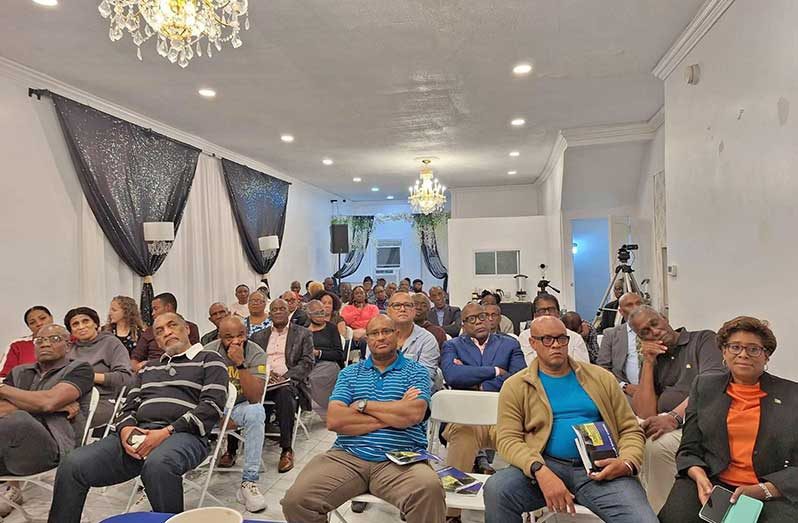–participant highlights absence of ‘solutions’ to alleged problems in Guyana
THE Alliance for Change (AFC) has again struggled to draw a satisfactory audience during its recent visit to New York, where it attempted to engage Guyanese in the diaspora.
The events, which were part of the AFC’s “Listening and Grounding” tour, were used to engage persons on the party’s efforts to “rebuild” itself.
However, based on images posted by party executives, the events were poorly attended, and critics said it reflects the reality of the ailing AFC.
At the October 4 meeting in Queens, New York, AFC Leader Nigel Hughes addressed a handful of people, and during a questions and answers session, a former member of the party posed a pointed question about the party’s future strategy.
“Are you prepared to challenge the president of the day? Are you going alone or with the PNC? How can you win as a small party?” he asked, addressing the party’s alignment with the larger People’s National Congress (PNC) and questioning the AFC’s viability as an independent political force.
Hughes acknowledged that the AFC had suffered significant political blows in recent years, attributing part of the downfall to one of its own candidates.

“The AFC suffered some significant impact to its political appeal as a party. One of our candidates was the reason why the coalition came out of government,” he admitted, referring to the collapse of the APNU+AFC coalition in 2020.
Hughes added that the party is now focused on rebuilding and is on a “listening” tour to gauge how Guyanese in the diaspora feel about its current direction.
However, the mood at the Queens, New York, meeting was punctuated by scepticism with one of the attendees, clearly disillusioned with the political process, voicing his frustration.
“This is why I don’t like politicians! They want to force you. You really can’t get nothing from them,” he said, as hecklers from the audience interrupted his comments.
Another attendee, a woman in the crowd, offered a more measured critique, pointing out the absence of solutions during the discussions.
“I heard a lot of the problems that Guyana faces. A lot of focus tonight has been on problems, and I feel a lot of the persons here are acutely aware of what those problems are. But I haven’t heard many solutions to those problems,” she said.
Hughes was also pressed about the party’s stance on key developmental projects, including the controversial cancellation of the Amaila Falls Hydropower Project (AFHP) during the APNU+AFC’s time in office.
“You said that successive governments cancelled or completely abolished developmental plans for the country, yet when the coalition government got into power, they cancelled the Amaila Falls project. Isn’t that a contradiction?” one man asked.
The project, initially slated to generate 165 megawatts of renewable energy, was scrapped by the APNU+AFC government in 2015.
Since returning to office in 2020, the People’s Progressive Party/Civic (PPP/C) has revived plans to make the project part of its broader energy security plan, with several international investors expressing interest in its development.
AFC’s recent Manhattan event on October 5, a more intimate wine and cheese gathering at the Richard Beaver Art Gallery, also saw a sparse turnout.
Similarly, at a meeting held in Linden during August, the AFC took a blow due to the incredibly low turnout as support was dull and did not match the party’s initial projections in what is supposedly one of its longstanding strongholds.
The poor turnout at these US meetings mirrors the party’s dwindling domestic support, a trend that has been evident in recent years.
At its Seventh National Conference in 2022, 285 delegates attended, but at this year’s conference, that number dropped to just 211—a clear indicator of the party’s decline. The fallout from the AFC’s termination of its political coalition with the APNU in 2022 also continues to roll.
The APNU+AFC coalition, formed ahead of the 2015 elections, propelled the two parties into government, but the alliance began to show cracks over time.
The AFC had openly complained that APNU was ignoring its smaller coalition members, leading to internal frustrations.




.jpg)










